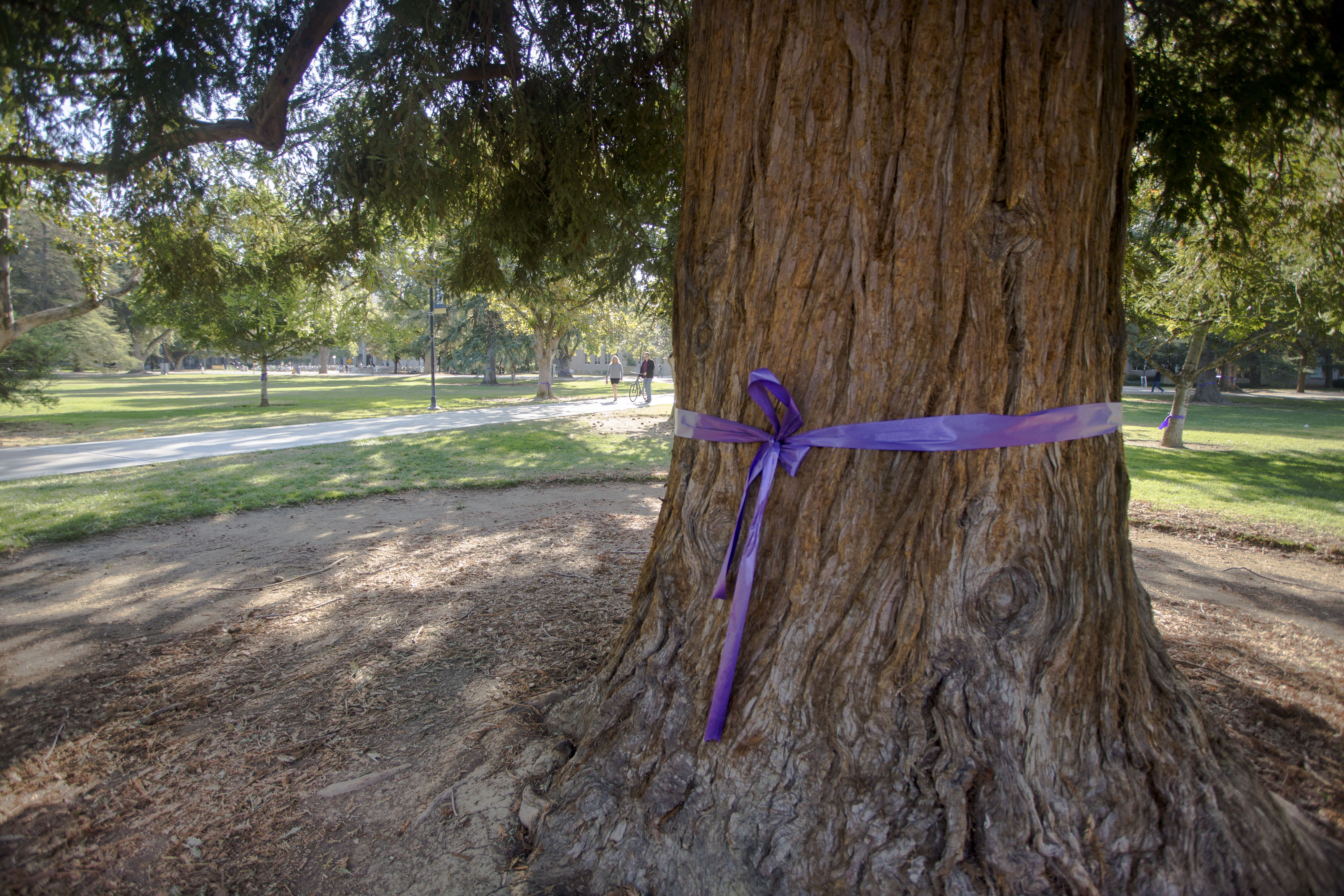
Resources on campus, October as awareness month, warning signs, healthy love
“America’s largest prison break” is how the Allstate Foundation describes domestic violence in this nation, where the current statistics show that one in four women will experience domestic violence in her lifetime. Allstate created a powerful ad focusing on the financial abuse aspect of domestic violence, depicting a woman in a jail cell secretly counting her savings, and when she eventually opens the cell door, we see that she is actually in a normal bedroom with her abuser lying asleep on the bed.
“Trust your instincts, love yourself before you love someone else,” said Claire Chevallier, a third-year psychology major and the chair of ASUCD’s Sexual Assault Advocacy and Awareness Committee (SAAAC). “Love shouldn’t hurt, and if a partner is being verbally or physically malicious, you should seek help.”
October is Domestic Violence Awareness month, and various campus organizations have been working to promote awareness and provide resources relating to this issue, while also doing what they can to support survivors year-round.
“I think it’s important to define domestic violence and dating violence first,” Chevallier said.
According to the UC Davis Sexual Violence Prevention and Response page, domestic Violence is “abuse committed against an adult or a minor who is a spouse or former spouse, cohabitant or former cohabitant, or someone with whom the abuser has a child, and has an existing dating or engagement relationship, or has had a former dating or engagement relationship. Dating Violence is defined as abuse committed by a person who is or has been in a social relationship of a romantic or intimate nature with the victim.”
Chevallier reiterated that abuse can be emotional, verbal, sexual or physical, and that people of all genders can be the victims or perpetrators in an abusive relationship. The UC Davis sexual violence page also provides details on the cycle of violence in a relationship.
Expanding on what Chevallier shared, Talia Peterson, a fourth-year evolution, ecology and biodiversity major and vice president of philanthropy for Alpha Chi Omega sorority, shared a much broader view on what classifies as domestic violence. Alpha Chi Omega is dedicated to supporting domestic violence awareness through its national philanthropy, and Peterson is in charge of planning events on campus to do just this.
“When you think of a traditional abusive relationship, we have a tendency to [picture] a married couple,” Peterson said. “But casual dating violence is still prevalent and abuse can happen in friendships [as well as] in parent to child relationships. It’s really [about] looking a little bit more broadly at what relationship violence looks like. [Domestic violence] can’t really be shoved into one little box.”
Not everyone will recognize abuse when they see it, even survivors. Chevallier listed some potential signs of abuse and violence.
“You may be experiencing domestic violence if your partner is insisting you only spend time with them, making you dependent on them, making you feel guilty or responsible for their aggressive behavior, insulting you and brainwashing you, threatening to hurt or kill you, telling you how to dress, stalking you or going through your personal belongings,” Chevallier said.
UC Davis has several organizations which serve as important resources for anyone who has experienced domestic violence. The Women’s Resources and Research Center (WRRC) is one of Davis’s confidential resources, which means that survivors of violence and trauma can seek support and information there with the assurance of confidentiality.
“In terms of building awareness around domestic violence and sexual violence, as a confidential resource we are constantly doing that work,” said Sara Blair-Medeiros, the assistant director of outreach at the WRRC. “This work is constant, and needs to be constant […] the resources that are available are really important, and they’re available and open to everybody.”
The WRRC does not work alone. Other confidential resources include the LGBTQIA Resource Center and the Center for Advocacy, Resources and Education (CARE). These groups and others often collaborate to provide education and awareness. Blair-Medeiros emphasized the importance of collaboration in the work of the WRRC, particularly as a way to create intersectionality in their programming.
“A large portion of the prevention education that CARE facilitates is done through collaborative partnerships,” Meredith said. “We often find opportunities to partner with other campus and community stakeholders such as the [WRRC], the LGBTQIA Resource Center and Empower Yolo. We partnered with the WRRC last month on a program called Postcard Power, which provided students with the opportunity to write to the Secretary of Education regarding recent changes in the administration’s guidelines on Title IX.”
The Title IX changes, which were made official in late September, loosened guidelines for how colleges and K-12 schools respond to sexual violence, raising the baseline standard of proof in disciplinary cases.
“The Title IX repeal hasn’t affected us in the sense of fundamentally changing our work and how we operate, but it has impacted the way we think about our work,” Blair-Medeiros said. “We are definitely thinking about the impact it could have on students that we serve, and thinking about our sibling institutions across the country.”
Recently, abuse and gender-based violence have been topics of repeated discussion in the news and other media. For Blair-Medeiros, conversations about domestic and gender-based violence are necessary, even in the media and other public spaces.
“It’s something that we really do need to be talking about on a regular basis, and not be afraid of talking about in a trauma-informed, survivor-informed way so that we’re not retraumatizing folks,” Blair-Medeiros said. “It’s important for the nation to be having this conversation, and conversations about all forms of violence. I think it’s great for people to be thinking about it, and I think if the media’s talking about it, chances are people are talking about it around the dinner table.”
Written by: Sahiti Vemula and Gabriel Mulcaire — features@theaggie.org



